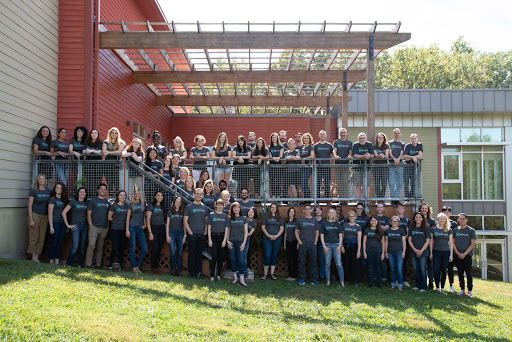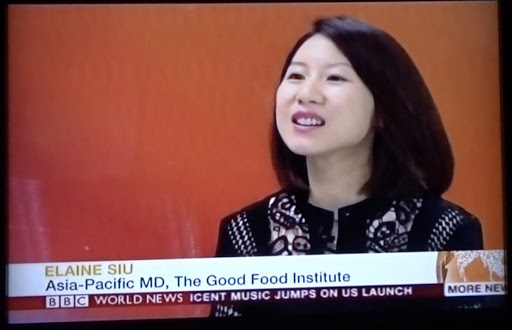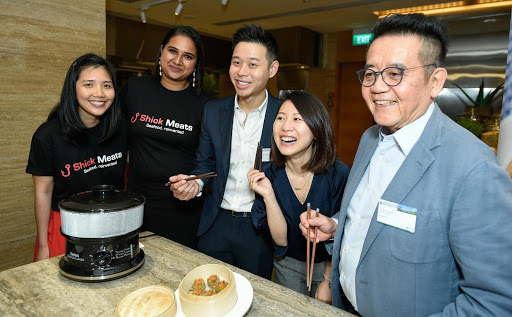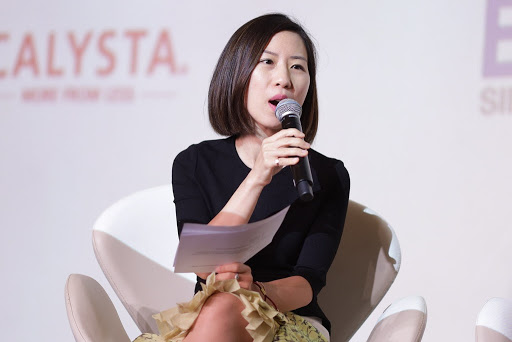Nonprofit startup: MS Entre grad went from creating a company to building new industries
As the world’s first sale of cultivated meat—meat grown directly from animal cells without using live animals as production units—was approved, Elaine Siu was preparing to pass the torch to her successor. After a few years of building the new alternative proteins industry, as well as creating a nonprofit startup as Managing Director of Good Food Institute (GFI) Asia Pacific to disrupt the broken food system, it was time to move on to challenge the status quo of another incumbent industry.
“A part of me still can’t believe it. What we’ve experienced with building and accelerating the alternative proteins industry is simply beyond our wildest dreams,” says Elaine Siu (MS 2018), an alumna of the Master of Science in Entrepreneurship Program (MS ENTRE) at the UW Foster School of Business.
GFI’s programs played a significant role that led to a 1,200% increase in the number of companies and organizations working in the alternative proteins industry within only 3 years.

Good Food Institute, initially built as a remote work organization. Staff met twice a year in a work-together retreat. Staff size has since grown to over 140 and counting.
“If someone had told me a few years ago that we could create a paradigm shift in the world by building a new industry through a nonprofit startup, I’d say they’re crazy. But now that we’ve done it once, I’m confident that we can replicate that success formula and apply it again and again.”
Many facets of entrepreneurship
Rewind to 2017, Siu was running a beauty e-commerce company that she would pitch as the “vegan Sephora,” after she had quit her finance law career of over a decade.
“The most valuable thing I learned in MS ENTRE is that there’s more than one way to be an entrepreneur, and I personally am not motivated by owning and running a business,” says Siu.
Siu was using business as means to an end. “I was only interested in starting a business because I believed that’s the most effective form of activism. I cared mostly about the measurable impact my business was creating towards the changes I wanted to see in the world, and cared way too little about, you know, the business!”
It was no surprise then that after folding her business, Siu joined a nonprofit. But that was not as straightforward as it may seem.
“I joined GFI despite it’s a nonprofit, not because,” says Siu, who was hired to found GFI’s affiliated company in Asia that is now Good Food Institute Asia Pacific. “I was 100% a corporate animal, turned startup wannabe, and my perception of nonprofit was still stuck in that outdated image of a ‘charity’ and the stigma of inefficiency.”
But it turned out that nonprofits created out of the effective altruism movement are very different from what Siu had expected.
The alternative proteins industry
Effective altruism is a research field that uses high-quality evidence and reasoning to work out the most promising solutions to the world’s most pressing problems. Efforts are recommended to be focused on high-impact causes that are typically (1) great in scale (i.e. it affects many lives, by a great amount); (2) highly neglected (i.e. few people are working on addressing the problem), and (3) highly solvable or tractable (i.e. additional resources will do a great deal to address it).

Representing the Good Food Institute on BBC back in 2018, the world has only just started using the term “alternative protein” then.
Applying the effective altruism theory, GFI was created to shift the world away from industrial animal agriculture which is one of the biggest culprits of climate change, environmental degradation, animal suffering, antibiotics resistance, and public health threats.
“I was fascinated by GFI’s theory of change,” says Siu. “When products that can replace meat, egg, and dairy taste the same or better and cost the same or less than the conventional industrial animal products, the market will shift.”
That is why GFI focuses on stimulating scientific research and development to generate technological advancements that will accelerate product quality, build with scalability, and achieve price parity.

Shiok Meats, Singapore’s first cultivated seafood company, showcased its prototype cell-cultured shrimp in a press conference in 2019. By the end of 2020, Singapore became the first country in the world to approve the sale of cultivated meat. The first approved product is created by Californian startup Eat Just, known for its plant-based egg products since 2013 and its cell-cultured chicken since 2021.
“I was surprised to learn that more than a few first-mover startups were formed through nonprofits like GFI pulling the strings behind the scenes,” says Siu, “and that became part of my job too, which was an exciting position to be in.”
Identifying white spaces, scouting the right entrepreneurs to create companies that fill those spaces, helping startups hire the right person to fill crucial roles like the CSO, advising on business and scientific strategies, and connecting startups with investors to raise funds. “What I learned in business school came in handy,” says Siu.
The next-gen materials industry
According to GFI research, the three pillars of alternative proteins: plant-based food companies have accumulated $2.3 billion in venture capital with over 99% invested between 2010 and 2019; cultivated meat companies have received more than $163.6 million investment with over 50% closed in 2019 alone; and fermentation companies devoted to alternative proteins have raised more than $837 million, 85% of which from 2019 and 2020.
As the alternative proteins industry takes off, Siu is moving to the next thing. Replacing animal-based materials like leather, silk, wool, fur, down, and exotic skins used in the fashion, automobile, and home goods industries with high-performance and more sustainable alternatives. Material Innovation Initiative is coining the term “next-gen materials” and building that new industry.
“We are starting over again, from creating the nomenclature to building the ecosystem,” says Siu.

Speaking at industry conferences forms a big part of the strategy to fill the knowledge gap, direct the public discourse, and connect industry stakeholders to move the needle through collaborations.
What is the success formula to building a new industry then?
According to Siu, first come a few poster child companies — the likes of Beyond Meat and Impossible Foods. Impact investors and venture capitalists are involved early, signs of success will drive more private funding into the space and ignite momentum.
Then comes the corporate partnerships and investments to take things mainstream. Examples include Burger King launching the Impossible Whopper and meat giant Tyson Foods investing in Memphis Meat (cultivated meat startup), which created significant market signals that accelerated the momentum. More investments attract more talents and enable more R&D activities, feeding into the new industry that is now taking form.
In the case of alternative proteins, public funding then started to catch up as governments began to realize that the new industry can relieve environmental crises, create new and better jobs, and help a country stay competitive.
“Interestingly, we as a nonprofit are well-positioned to work on each of these elements. From grooming the startup and investment communities to corporate engagement, to generating research funding, and lobbying for policies that create a level playing field for the new industry to compete in. An effective nonprofit can be the industry builder and dealmaker to create big changes in the world,” says Siu.
Elaine is publishing her new book Your Next 40,000 Hours: Falling into an Illuminating Second Career to inspire more mid-career professionals to shift into purpose-driven, high-impact jobs to make a difference in the world.
Check out her pre-sale campaign that ends Apr 30, 2021.
